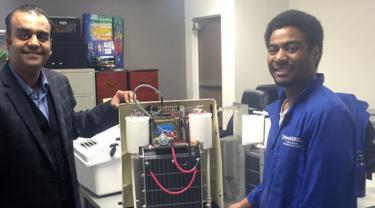Markham-based Lyte Energy is a cleantech company specializing in hydrogen energy production, storage and related solutions. Lyte has spent the last three years preparing to break into world markets. Nauman Kureshy is the company’s president and CEO.
Learn more about the company’s export journey here.
Why and when did you first start considering exporting?
Right from the beginning. We believe we have the right technologies that can help the globe, so that’s been our strategy since day one.
What has your export journey been like to get where you are today?
We haven’t shipped any product, but that doesn’t mean we aren’t an exporting company. It’s taken a lot of hard work, planning, and preparation to get to the stage we are at now – ready to take on the world. We’ve also had to embark on an educational crusade. We’re ready to go global.
What is the biggest difference between selling in Canada and in another country?
For us, there hasn’t been too much of a difference so far, because we are working with new technologies. However, Canadians are more environmentally conscious than most countries, so they understand our business mantra better.
It’s also an issue of trust. When you are doing business internationally, you want to ensure that you have trusted relationships on the ground, so you can ensure you will get paid. Not everyone does business like Canadian companies do with honesty and integrity on top of mind all the time.
Is there a specific anecdote from your company’s history that you would consider a critical moment so far?
I think the biggest thing for Lyte Energy is the fact that we are a Canadian company in the cleantech space. Canada has a global reputation of being green, so that’s helped us immensely.
As a Canadian company, our credibility is very high internationally. The world wants to do business with Canada, because we’re regarded highly for that important element of trust. Many global companies would rather do business with Canadian companies than companies located in other countries, including the U.S.
What’s the number one thing SMEs need to know about exporting and trade?
Don’t assume anything. Do your research and then do it again. Being prepared –knowing the market and knowing your competitor are ingredients in the recipe for success. Then, develop trusted partnerships on the ground. That will help mitigate the risk of trying to break into the market on your own.
Also, use EDC as it can really help create shortcuts and provide great market intelligence and facilitate making great contacts for you.
What’s one characteristic every exporter should possess?
I would say trust and integrity are the most important characteristics.
What was your first export sale?
After a lot of effort, it appears it’s going to be in China, and very soon.
How did that opportunity arise?
Roger Sabourin, our Senior Vice President, had great contacts from a previous life. He reached out to those contacts and they’ve helped knock on, as well as open, a few of the right doors.
What makes you nervous about exporting these days?
When you are doing business internationally, it’s always political – government and policy changes – that worries me. You may have a contract and then a decision can be made where you suddenly don’t have anything and lose it all. However, you can mitigate that by developing trusted relationships.
What excites you about exporting and where do you see the most opportunities?
We’re really just starting our export journey, but it’s taken a lot of work to get here. That said, hydrogen as an energy vector presents a whole new world of opportunity and we want to drive the hydrogen industry globally. China and India present the most opportunity for us right now.
Will you take advantage of CETA once it’s finalized?
Definitely. The EU will be a huge market for us and we’ve already established Lyte Energy Europe GmbH in Germany. We hope to make many inroads in the EU.
How has the trading world changed since the election of more protectionist government in the U.S.?
It may push our U.S. plans back somewhat because the new administration isn’t focusing on measures to combat climate change. However, we are working with the California Air Resources Board (CARB) right now. We will have to wait and see what plays out, but the reality is that the Chinese population is demanding action on climate change right now, so governments can’t afford to be complacent.





